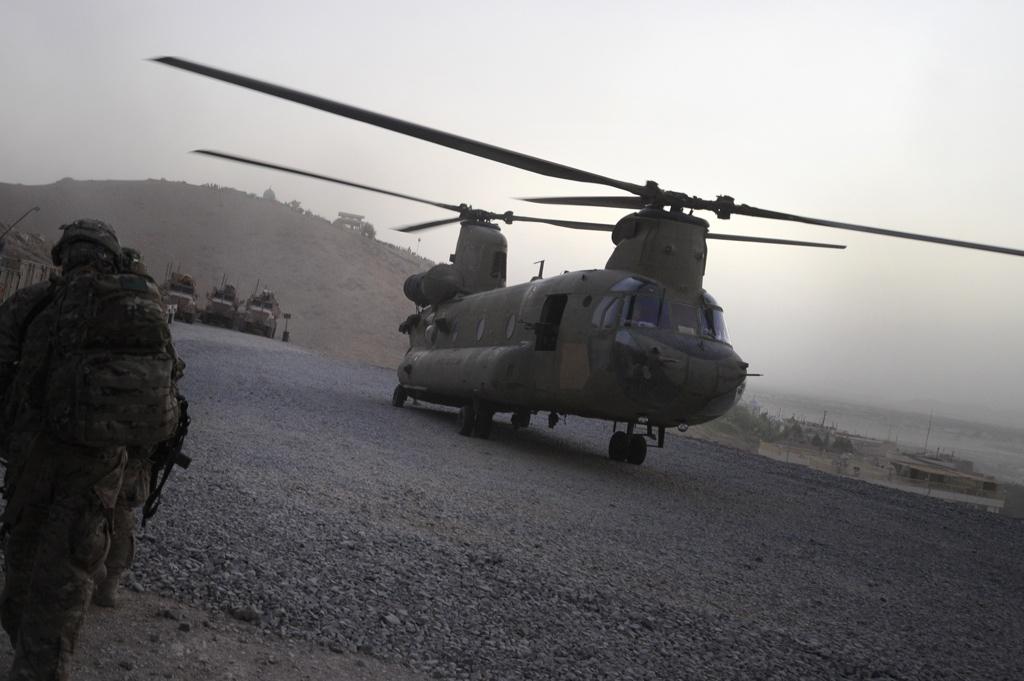Taliban attack highlights its growing power
A U.S. military Chinook helicopter lands at Forward Operating Base in Arghandab district southern Afghanistan on July 29, 2011.
KABUL, Afghanistan — The Taliban’s downing of a U.S. helicopter that left 37 dead, including 30 Americans, early Saturday morning, is raising concerns about the Taliban’s growing capabilities on the battlefield, and scored a propaganda coup for an insurgency that had yet to challenge NATO’s air supremacy in the decade-long war.
The Chinook CH-47 helicopter — a transport chopper that can fit up to 40 fully-equipped troops — was shot down in central Afghanistan’s Wardak province with 22 Navy SEALs, three other special operators, and five crewmen on board, officials said.
The incident marked the single deadliest day for NATO coalition troops since the war in Afghanistan began 10 years ago.
The chopper plummeted after being shot by what is believed to have been a Taliban-launched, rocket-propelled grenade (RPG), and followed a special forces night-raid in Wardak’s volatile Tangi Valley that sparked a two-hour gun battle with insurgents holed up in the targeted compound.
GlobalPost in Afghanistan: Welcome to Hell
A member of the Afghan Local Police (ALP) in Wardak, who wished to remain anonymous, said he saw the wreckage of the helicopter and that it had been shot in the nose with an RPG.
Taliban spokesman Zabiullah Mujahid, speaking to GlobalPost, said his fighters had used “a weapon similar to an RPG,” but would not elaborate further.
On the heels of a string of high-profile attacks and assassinations carried out by the Taliban in recent months, Saturday’s crash was a psychological victory for insurgents and a blow to coalition troops.
When the Soviets occupied Afghanistan in the 1980s, it was the surface-to-air Stinger missiles supplied to anti-Soviet guerrillas by the United States that eventually crippled the Red Army here.
But despite the fact that the Taliban does not maintain serious anti-aircraft capabilities, the incident boosts the already growing perception that the insurgents are gaining in strength and adaptability as the war drags on.
As the Afghan government slowly loses control of key areas of the country, NATO troops have begun withdrawing troops, with all combat troops set to leave by 2014.
The Taliban have managed to strike deep in the heart of Kabul to carry out spectacular attacks this summer, as well as penetrated the security of high-level officials the movement later assassinated.
The effect on Afghan politicians and officials has been chilling.
“I don’t think that any of the neighboring countries that use anti-aircraft weapons would give them to the Taliban,” says Helaluddin Helal, an Afghan former general.
GlobalPost in Kandahar: Caught in the crosshairs, assassinations are on the rise
“But this is a warning for the international community that they should be more serious about this issue. They should focus more on the Taliban and what types of weapons they’re getting, and what types of attacks they’re planning,” he said.
Late Sunday in Afghanistan there were reports of clashes between U.S. troops and Taliban fighters in the area where the chopper went down, but details were sketchy.
The Tangi Valley, which cuts across the Sayd Abad district in Wardak province, and is just 60 miles from Kabul, has long been a hotbed of Taliban insurgency.
Bordering Logar province to the east and Ghazni province to the south, both of which have high levels of insurgent activity, Sayd Abad acts as a gateway for militants looking to expand influence in central Afghanistan.
The U.S. army withdrew from its combat outpost in the Tangi in April, but keeps another base elsewhere in Sayd Abad.
“The situation in Wardak is worse than it was last year, and there are many districts where the security forces can’t go without coming under attack,” said Abdul Ahmad Durrani, a member of parliament from Wardak.
“The presence of the foreign forces has increased in Wardak,” Durrani said. “But there is still no positive effect.”
Indeed, in Wardak and across Afghanistan, security has deteriorated sharply in the last year, despite bolstered U.S. troop levels, bringing the insurgency closer to the capital.
GlobalPost in Russia: Russia's addiction to Afghan heroin
This year has been the deadliest year for civilians since 2001, according to the United Nations Assistance Mission for Afghanistan (UNAMA), and many fear the violence will only increase.
While some observers say the Taliban knocked the helicopter out of the sky with a stroke of pure luck, they also believe their success in downing a US aircraft will push them to continue to take aim.
“The location was good for the Taliban, and they had good information about the area and about the raid that was happening,” Helal said. “They were successful in this attack, and this means they will target more helicopters.”
Every day, reporters and producers at The World are hard at work bringing you human-centered news from across the globe. But we can’t do it without you. We need your support to ensure we can continue this work for another year.
Make a gift today, and you’ll help us unlock a matching gift of $67,000!
